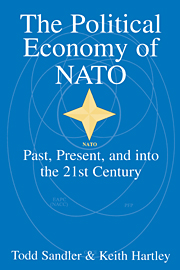Crossref Citations
This Book has been
cited by the following publications. This list is generated based on data provided by Crossref.
SANDLER, TODD
1998.
Global and Regional Public Goods: A Prognosis for Collective Action.
Fiscal Studies,
Vol. 19,
Issue. 3,
p.
221.
Hartley, Keith
1999.
The future of NATO: a defence economics perspective.
Economic Affairs,
Vol. 19,
Issue. 4,
p.
37.
Brauer, Jurgen
1999.
An economic perspective on mercenaries, military companies, and the privatisation of force.
Cambridge Review of International Affairs,
Vol. 13,
Issue. 1,
p.
130.
Khanna, Jyoti
Sandler, Todd
and
Shimizu, Hirofumi
1999.
The Demand for UN Peacekeeping, 1975–1996.
Kyklos,
Vol. 52,
Issue. 3,
p.
345.
Hartley, Keith
and
Sandler, Todd
2000.
Defence and peace economics: A ten‐year retrospective.
Defence and Peace Economics,
Vol. 11,
Issue. 1,
p.
1.
Wallander, Celeste A.
2000.
Institutional Assets and Adaptability: NATO After the Cold War.
International Organization,
Vol. 54,
Issue. 4,
p.
705.
Sandler, Todd
2000.
Arms trade, arms control, and security: Collective action issues.
Defence and Peace Economics,
Vol. 11,
Issue. 3,
p.
533.
Sandler, Todd
and
Murdoch, James C.
2000.
On Sharing NATO Defence Burdens in the 1990s and Beyond.
Fiscal Studies,
Vol. 21,
Issue. 3,
p.
297.
McGuire, Martin C.
2000.
Concepts of defense economics for the 21st century.
Defence and Peace Economics,
Vol. 11,
Issue. 1,
p.
17.
Brauer, Jurgen
and
Roux, André
2000.
Peace as an international public good: An application to Southern Africa.
Defence and Peace Economics,
Vol. 11,
Issue. 4,
p.
643.
Nelles, Wayne
2001.
Toward Better Communications Co-operation for Central and South Eastern Europe: Trends and Prospects.
Higher Education in Europe,
Vol. 26,
Issue. 2,
p.
227.
Gadea, María‐Dolores
and
Montañes, Antonio
2001.
An analysis of defence spending in Spain: A long‐run approach*.
Defence and Peace Economics,
Vol. 12,
Issue. 5,
p.
369.
Voeten, Erik
2001.
Outside Options and the Logic of Security Council Action.
American Political Science Review,
Vol. 95,
Issue. 4,
p.
845.
Hartley, Keith
2001.
UK defence spending.
The RUSI Journal,
Vol. 146,
Issue. 1,
p.
14.
Edgar, Alistair D.
2001.
Growth pains or growing strains?.
Canadian Foreign Policy Journal,
Vol. 8,
Issue. 2,
p.
1.
De La Fe, Pedro Gonzalez
and
Montolio, Daniel
2001.
Has Spain been free‐riding in nato? An econometric approach†.
Defence and Peace Economics,
Vol. 12,
Issue. 5,
p.
465.
Siqueira, Kevin
and
Sandler, Todd
2001.
Models of alliances: Internalizing externalities and financing.
Defence and Peace Economics,
Vol. 12,
Issue. 3,
p.
249.
Pérez‐Formés, Claudia
and
Cuenca, Alain
2001.
Nato in the post‐cold war: An empirical analysis.
Defence and Peace Economics,
Vol. 12,
Issue. 5,
p.
487.
Hartley, Keith
2001.
Managing the Revolution in Military Affairs.
p.
89.
Hanes, Niklas
2002.
Spatial Spillover Effects in the Swedish Local Rescue Services.
Regional Studies,
Vol. 36,
Issue. 5,
p.
531.





